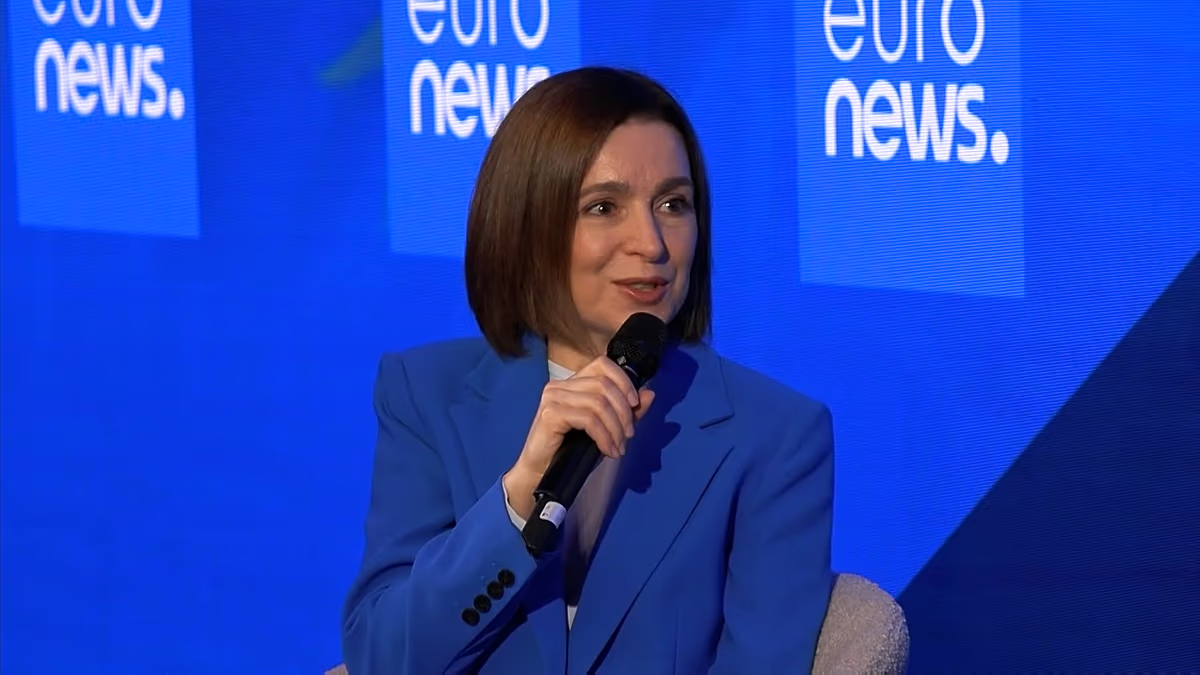On November 6, 2025, Moldovan President Maia Sandu emphasized the necessity for the European Union (EU) to adopt “creative” methods to expedite the political progression of Moldova’s bid for EU membership. Speaking to Euronews during an EU enlargement summit in Brussels, Sandu noted that her pro-European campaign focuses on ensuring Moldova’s independence amidst growing Russian influence. As Moldova navigates its candidacy alongside Ukraine, it faces challenges in overcoming hurdles related to EU accession logistics, particularly the unanimous agreement required from all member states.
| Article Subheadings |
|---|
| 1) Political Context of Moldovan Membership |
| 2) Reform Efforts and EU Response |
| 3) The Intersection of Moldova and Ukraine’s Bids |
| 4) Challenges of EU Accession |
| 5) Future Prospects for Moldova’s EU Membership |
Political Context of Moldovan Membership
Moldovan President Maia Sandu highlighted the importance of her country’s EU membership during an EU enlargement summit. After winning a second term in office with a pro-European stance, Sandu expressed that EU membership represents the best safeguard against external pressures, particularly from Russia. With a population of 2.4 million, Moldova is keen on establishing its sovereignty and aligning its governance models with European standards amidst increasing geopolitical tensions. The political landscape in Moldova has been primarily marked by fears of Russia’s influence, with elections scrutinized for potential foreign interference and fraudulent practices.
Reform Efforts and EU Response
Moldova submitted its application for EU membership in 2022 and received candidate status in June of the same year, alongside Ukraine. The European Commission’s recent report commended the pace of reforms undertaken by Moldova, emphasizing alignment with EU standards as integral to the membership process. The Commission has advised that negotiations should open on three specific clusters of requirements immediately, with additional clusters to follow. This backing from the EU reflects an acknowledgment of Moldova’s commitment to fulfilling necessary reform criteria and overcoming the backdrop of significant Russian meddling in its internal affairs.
The Intersection of Moldova and Ukraine’s Bids
Moldova’s EU membership aspirations are intricately linked to those of Ukraine. Despite each country’s application being merit-based, the EU has been cautious in advancing Moldova’s bid independently, believing that the two nations should progress jointly due to their geographical and strategic proximity. Ukraine’s application predates that of Moldova, and officials have expressed concerns that treating their candidacies separately could send a negative signal. The context of this relationship is complicated further by current political dynamics, notably Hungary’s persistent veto against Ukraine’s EU membership, causing uncertainty that threatens to stall both countries’ aspirations.
Challenges of EU Accession
One of the main obstacles to Moldova’s EU accession lies within the very structure of the EU itself. The requirement for unanimous agreement among the 27 member states creates a daunting barrier. Maia Sandu highlighted the necessity for the EU to reconsider its internal policy processes to elevate the enlargement momentum. She implied that while merit-based criteria are pivotal, political solutions are essential to navigate the intricate veto arrangements that currently hinder progress. As the new Moldovan government continues to align its reforms with EU stipulations, the challenge remains to overcome political deadlock among member states while attempting to complete the technical chapters necessary for full membership.
Future Prospects for Moldova’s EU Membership
Looking ahead, Moldova aims to finish accession negotiations by 2028. This ambitious target was deemed achievable by EU officials, reflecting a measure of optimism regarding the progress made thus far. António Costa, the head of the European Council, urged leaders to keep the momentum on enlargement, warning that failure to do so may result in the EU becoming “trapped by painful historical legacies.” This sentiment underscores the importance of perceptible progress not only for Moldova but for the EU’s broader geopolitical strategy to solidify its borders against external autocratic influences.
| No. | Key Points |
|---|---|
| 1 | Moldovan President Maia Sandu is prioritizing EU membership to ensure national independence. |
| 2 | Moldova’s application for EU membership was submitted in 2022, with candidate status granted in June of the same year. |
| 3 | The EU has recommended the opening of multiple negotiation clusters based on Moldova’s reform efforts. |
| 4 | Moldova’s candidacy is closely linked to Ukraine’s, with both countries facing challenges from EU member state vetoes. |
| 5 | Moldova aims to complete accession negotiations by 2028, a deadline deemed achievable by EU officials. |
Summary
The urgency conveyed by Maia Sandu for more innovative solutions within the EU framework reflects the precarious position of Moldova as it seeks membership. The intertwined fates of Moldova and Ukraine pose both a challenge and an opportunity for EU expansion policies. As geopolitical currents shift, the need for mutual support among candidate nations has never been more critical. The evolving situation underscores the importance of EU solidarity and adaptability in accommodating the aspirations of aspiring members.
Frequently Asked Questions
Question: What reforms is Moldova pursuing to meet EU standards?
Moldova is implementing a range of reforms aimed at aligning its governance, legal frameworks, and economic policies with EU standards, which includes anti-corruption measures and judicial independence.
Question: Why is Moldova’s application tied to Ukraine’s?
Moldova’s application is intertwined with Ukraine’s due to their geographical proximity and shared strategic interests, leading to EU concerns about progressing the two applications separately.
Question: What are the clusters that Moldova needs to negotiate for EU membership?
Clusters refer to specific sets of regulations and reforms that candidate countries must complete to progress toward EU membership. These clusters encompass areas such as the rule of law, economic policies, and human rights protections.


